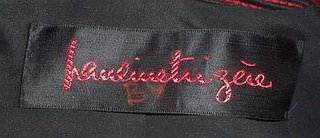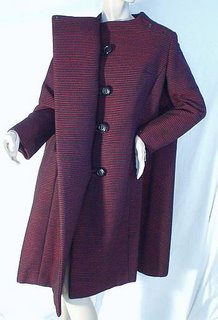
Pauline Trigere was one of America's finest and most important designers. She started her own line in 1942 and continued to design into the late 1980's. During that time she won the Coty American Fashion Critics Award four times, and was inducted into its Hall of Fame in 1959. In 1993, Trigère received the Lifetime Achievement Award from the Council of Fashion Designers of America.
Trigere was known for her crisp, tailored cuts and innovative ideas, particularly with outerwear and this coat is a fine example. Dating to about 1963-64, this coat is fashioned from a heavy black wool accented with horizontal lines of red wool stitching.

This coat is from the high end Pauline Trigere designer label, not the mid-range licensed line. The coat is very sculptural in its design and the wool is backed with stiff interfacing to hold the lines of the design.

What makes this coat so innovative is the use of small tucks at the back of the shoulders which flare out to the hem and make the back look like a cape.

The button and loop closure is completely hidden behind an extended front closure that snaps at the neckline.
See this coat and more at Couture Allure Vintage Fashion .












